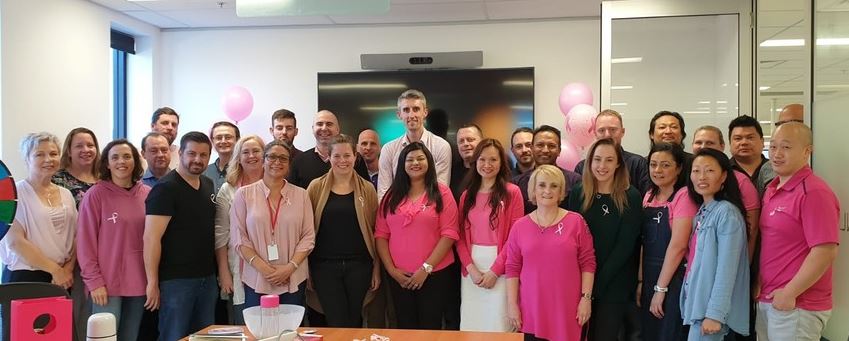After being in business for over 40 years, Dicker Data is Australia’s largest IT hardware and services distributor. A champion of flexible working arrangements for women with children in an industry which is notoriously male-dominated, Dicker Data was basically built from the ground up by a committed staff of working mums.
As one of those 15 working mums, Mary Stojcevski thrived at Dicker Data and today she’s the CFO and Executive Director. From these early times, the founders and executives at Dicker Data never forgot how well Stojcevski and the other women worked and how productive they were. As a result, many of them are still with the company.
Today, the Aussie tech company openly attributes its success to its steadfast commitment to gender equality – particularly its practices which empower female professionals to thrive and excel in their careers.

As well, the company still offers great support to working parents with support for working mothers since day one. Plus, added touches such as free lunch for all the staff mean this is a company really does appreciate its staff!
As Stojcevski says: “If organisations are serious about evolving to meet the challenge of the new normal, that should include bridging the gender gap and accelerating the representation of women in leadership positions in the workforce.
Dicker Data has a high female to male ratio
Employing over 500 people, today the board at Dicker Data comprises three female and four male directors so the female board level representation is at 43% which is high for the notoriously male-dominated tech industry.
In general, the company now has 43% female and 57% male staff and this shows a higher representation of women than you’ll find in most other areas of the IT sector in Australia.
In fact, women make up a mere 29% of Australia’s tech workforce and there’s still an 18% gender pay gap. To address this, Stojcevski says the sector needs to not only ensure opportunities are accessible to women but to also needs to look at ways to attract more women to tech.
We spoke with Stojcevski more about these issues. Firstly, we asked her how she came to be one of the Executives and the CFO at Dicker Data?

“When I started working at Dicker Data part-time as financial controller, although the business was doing approximately $100m turnover, there was very little in the way of formal reporting and structured processes. The workforce at that time was approx. 15 women, all working flexible hours. I started in a newly-created role and progressively ended up with more and more responsibility including the AR, AP, HR Payroll and Financial Reporting functions.
“Prior to joining Dicker Data, I worked in several mid-tier or smaller accounting firms doing all facets of accounting work including, tax, financial reporting, audit for over 10 years. Then I joined Legal & General Insurance – which was later acquired by Colonial and CBA – in a corporate tax role for a couple of years. With two young children at the time, I moved to Dicker Data for the flexibility it offered and proximity to home.
“I’ve been fortunate to have had my role and responsibilities grow with the business. I started as the financial controller in 1999 and was then offered the CFO role and an executive director position in 2009 prior the company listing. With my family growing with two more babies after joining Dicker Data, I was able to work around family commitments. This included having the younger two babies with me at the office from time to time when it was required.
“I was working closely with the founders who both have very strong visions and convictions about how things should be and this made it easier because I knew what outcomes needed to be achieved. My role has been to assist us in executing those visions so we could get to where we wanted to be.
“In hindsight, a lot of what Dicker Data was doing was ahead of the times – they supported mums returning to work, gave flexible hours, paid you for the hours you did so there was no guilt about taking time off, they provided onsite childcare and free lunch for all the staff – even to this day!”

Dicker Data has a commitment to providing equal opportunity to women in tech. How does the company make sure this happens?
The company is founded on flexible working for return to work mums. It is at the core of the company’s foundation and it had nothing to do with trying to achieve gender equality or ticking a compliance box – both David Dicker and Fiona Brown – the founders of the company – strongly believe you get the best outcome from this demographic.
“We had the opposite issue earlier on and because we had more women in our staff, we had to work to increasing the number of males. This was achieved and pre-IPO which was prior to 2010, I would say we would have had fairly balanced representation but now we are slightly skewed to more males.
“We also have a board of directors that is fairly equitably split – at the moment we have three female and four male directors, with female board level representation at 43%. This has all been achieved organically without specific policies and targets.
“However, gender equality in some of our general management and senior management roles is probably tracking a bit lower than these ratios and this is an area we would like to address. We have recently joined Microsoft Champions of Change (MCC) – an initiative started by one of our largest partners Microsoft, with the aim of having a more targeted approach on how we move the dial on the senior leadership roles in organisations.
“The MCC group was established to help accelerate the technology sectors push for gender equality and it is committed to finding innovative, even disruptive ways to lower the barriers to entry into IT so that women are encouraged to enter the workplace and to thrive. We felt these principles were in line with ours so we joined.
“In addition to this we have recently introduced not only a paid parental leave policy, but also our own internal salary continuance policy to support our staff with paid leave in the event they need to take extended leave to deal with major health issues, being up to a further 12 weeks paid leave.
“Both policies were introduced at the same time with the same amount of paid leave and these, together with any leave entitlements mean all staff can take the necessary time dealing with important life events, whether caring for a new child or dealing with a major health crisis. These types of policies, coupled with already existing flexible work arrangements, ensure we are supporting and creating an environment to retain staff, especially women.
“In our new building, which we expect to move into by the end of the year, we are building a dedicated family room. This is so that in the event anyone ends up needing to care for a child, but also needs to be in the office for whatever reason, there will be a dedicated and safe space to cater for young children or breast-feeding mums. We are not sure yet how this space will be used on a day-to-day basis, but we’ve created the space for this to evolve, based on staff and business requirements.
“The new building may also offer onsite vacation care programs. Usually with daycare and under five-year-olds, you would have ongoing arrangement with a daycare provider, but this is much harder with school-aged children during school holidays. I saw an outsourced program run at the CBA and it is definitely something I want to introduce in our new building. We will have the space to cater for this and we’ll be looking to run it with a third-party provider that specialises in these programs.”

They are moving to a new building soon and an on-site childcare facility will be included.
Do you feel it’s important to recognise and accelerate the leadership of women in tech? If so, why?
“As more and more businesses head down their digital transformation journey and technology plays an integral part of all industries and society in general, making sure there is diversity of thought in the design, development, procurement and deployment of tech solutions will be even more important.
“Compared to other sectors, personally I believe the tech sector as a community has done a good job in promoting gender diversity. I feel as a sector it is more proactive and vocal than some other industries but clearly the numbers indicate further improvement can be made and with such initiatives as MCC, you have a more targeted approach, supported and sponsored by the leaders of the collective member organisations to make further measurable change.”
What are the challenge to reducing barriers to senior positions for women and what proactive initiatives do you think should be taken to connect, engage and retain female employees?
“The challenges to reducing barriers include removing the guilt factor. I know I have experienced this – guilty for not being able to dedicate more of your time to work and guilty for not dedicating enough of your time to your family – especially young children. I don’t think that ever goes away – even as they become adults.
“As well, I think we have to normalise flexible work. We need to develop a culture where people are hired to achieve outcomes rather than do specific hours. Then we need to introduce policies that support this.
“Another thing we need to do is help our hiring managers be more conscious of gender equality and diversity in the recruitment process. People tend to hire candidates that are similar to them, so there may be an unconscious bias we can help eliminate.
What do you feel COVID-19’s impact has been on women in tech? Have they been more likely to be paid off than men?
“In terms of the tech industry it was clearly one of the beneficiaries during the last few months, so whilst there have been job losses and whole sectors dramatically impacted by the COVID pandemic, this was not experienced by some parts of the technology sector and definitely not for our organisation.
“We found it was one of our highest trading periods with the big demand for Work From Home solutions so I don’t think the impact for women in tech has been as dramatic as the impact for women in other industries.”
During COVID-19, how do you feel remote work changed the work-life balance for mums?
“There have been some pros and cons with the swift transition to WFH arrangements. Whilst commute times are reduced and juggling morning and after school routines may have been easier, the fact that all parts of the community shut down including schools, would have exacerbated the pressure on work/life balance with the requirement for home schooling.
“Although this responsibility may not have all fallen entirely on the mums, there has been much anecdotal evidence to suggest they carried a much higher burden. Also, the lines between work and home did become blurred.
“On the plus side I think it has become evident that flexibility in the work place can be normalised at all levels and for all roles. This is a plus for women looking to move into senior leadership roles where previously they may have intentionally excluded themselves.”
For more information on Dicker Data visit the company’s website here.






